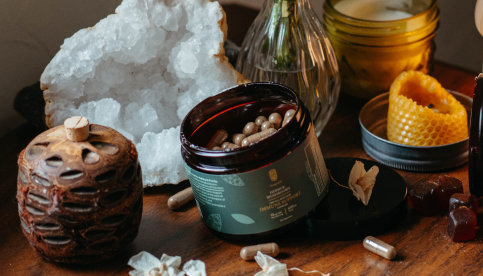
7 Signs Your Mushroom Capsules Have Expired (And What to Do)
Yes, mushroom capsules do expire. Like all supplements, they have a shelf life. Understanding this is crucial for your health and wallet.
Expired capsules may lose potency. They might not deliver the benefits you expect. Worse, they could even become harmful.
So, how do you know when they expire? What factors affect their shelf life? Keep reading to find out.
Key Takeaways
-
Mushroom Capsules Expiry: Mushroom capsules do expire, and understanding the factors affecting their shelf life is crucial for maintaining their efficacy and safety.
-
Shelf Life Duration: Typically, mushroom capsules have a shelf life of one to two years, depending on storage conditions, packaging, and ingredients.
-
Storage Recommendations: To extend shelf life, store capsules in cool, dry places away from direct sunlight, and use airtight containers.
-
Identifying Expired Capsules: Look for signs such as color change, odd smell, clumping, and always check the expiry date on the package.
-
Health Risks of Expired Capsules: Consuming expired capsules may lead to reduced efficacy, adverse reactions, and potential toxicity, necessitating proper disposal when expired.
Understanding Mushroom Capsules
What Are Mushroom Capsules?
Mushroom capsules contain dried and powdered mushrooms or mushroom extracts. They provide a convenient way to consume mushrooms for their potential health benefits. You may find these capsules from various fungi like reishi, turkey tail, and lions mane mushrooms.
Common Types of Mushroom Capsules
The market offers several types of mushroom capsules. Here's a quick list:
-
Reishi Mushroom Capsules: Often used for immune support and stress reduction.
-
Turkey Tail Mushroom Capsules: Known for their immune-boosting properties.
-
Lions Mane Mushroom Capsules: Popular for enhancing cognitive function and nerve health.
-
Chaga Mushroom Capsules: Valued for their antioxidant content.
Each type offers unique benefits, making it easy to choose based on your health needs.
Shelf Life of Mushroom Capsules
Understanding the shelf life of mushroom capsules is crucial for maintaining their efficacy and safety. The shelf life typically ranges from one to two years when stored properly. Storage conditions, packaging, and ingredients significantly impact this duration.
Factors Affecting Expiration
Several factors influence the expiration of mushroom capsules:
-
Storage Conditions: Temperature, humidity, and light exposure play critical roles. Capsules stored in cool, dry, and dark places last longer.
-
Packaging: Airtight, opaque containers are ideal. They protect capsules from moisture and light.
-
Ingredients: Capsules containing powdered mushrooms generally have a shorter shelf life compared to those containing extracts.
-
Manufacturing Date: Check the manufacturing date to ensure freshness. It's a key indicator of shelf life.
How to Identify Expired Capsules
Expired capsules may lose potency or become unsafe. Signs of expiration include:
-
Color Change: Discoloration indicates degradation.
-
Odd Smell: A rancid or unusual odor suggests spoilage.
-
Texture: Clumping or moisture inside the packaging signals expiration.
-
Expiry Date: Always check the expiry date printed on the package.
Keeping these factors and indicators in mind ensures you benefit fully from your mushroom capsules.
Storage Tips for Longer Shelf Life
Best Practices for Storage
Store mushroom capsules in a cool, dry place. Moisture and heat degrade the active compounds. Avoid direct sunlight which affects potency. The optimal temperature range is between 60°F (15°C) and 75°F (24°C).
Use airtight containers to maintain freshness. Plastic bags or make-shift covers aren’t effective. Silica gel packs inside containers absorb excess moisture.
Keep capsules away from strong odors. Certain compounds are sensitive to smells from cleaning products or spices. This preserves their natural aroma and efficacy.
The Role of Packaging in Preservation
Packaging plays a critical role. High-quality containers with UV protection keep capsules potent. Dark glass bottles are preferable over plastic.
Check the seal integrity before purchasing. A good seal prevents contamination and air exposure. Choose brands that use vacuum-sealed packaging for enhanced shelf life.
Consider individually sealed packages. These provide an extra layer of protection by minimizing exposure each time you open the container.
Health Implications of Expired Mushroom Capsules
Risks of Consuming Expired Capsules
Consuming expired mushroom capsules poses several health risks. Potency loss, chemical changes, or contamination might occur. Ingesting degraded capsules could lead to reduced efficacy or adverse reactions.
-
Reduced Efficacy: Expired capsules, like reishi or lion's mane, might lose their beneficial properties. This diminishes their health benefits, impacting your wellness routine.
-
Adverse Reactions: Degraded capsules may cause gastrointestinal issues or allergic reactions. This occurs due to breakdown or contamination of ingredients.
-
Toxic Compounds: Some mushrooms, such as turkey tail, may develop harmful compounds when expired. These could potentially lead to serious health problems.
When to Discard Mushroom Capsules
Identifying when to discard mushroom capsules ensures you avoid health risks.
-
Expiration Date: Always check the package for the expiration date. Discard capsules past this date.
-
Changes in Appearance: If capsules show discoloration, odd smells, or texture changes, they should be discarded.
-
Storage Issues: Improperly stored capsules in humid or exposed conditions might degrade faster. Discard these to avoid potential health risks.
Ensuring that your mushroom capsules are potent and uncontaminated guarantees the desired health benefits.
Conclusion
Understanding the expiration of mushroom capsules is crucial for your health and well-being. Paying attention to signs like color changes odd smells and texture alterations can help you identify expired capsules. Consuming expired capsules can lead to reduced efficacy and potential health risks.
Always store your mushroom capsules properly and discard any that are past their expiration date or show signs of deterioration. By doing so you'll ensure you're getting the maximum benefits and avoiding any adverse effects. Prioritize your health by being mindful of the shelf life and storage conditions of your supplements.




